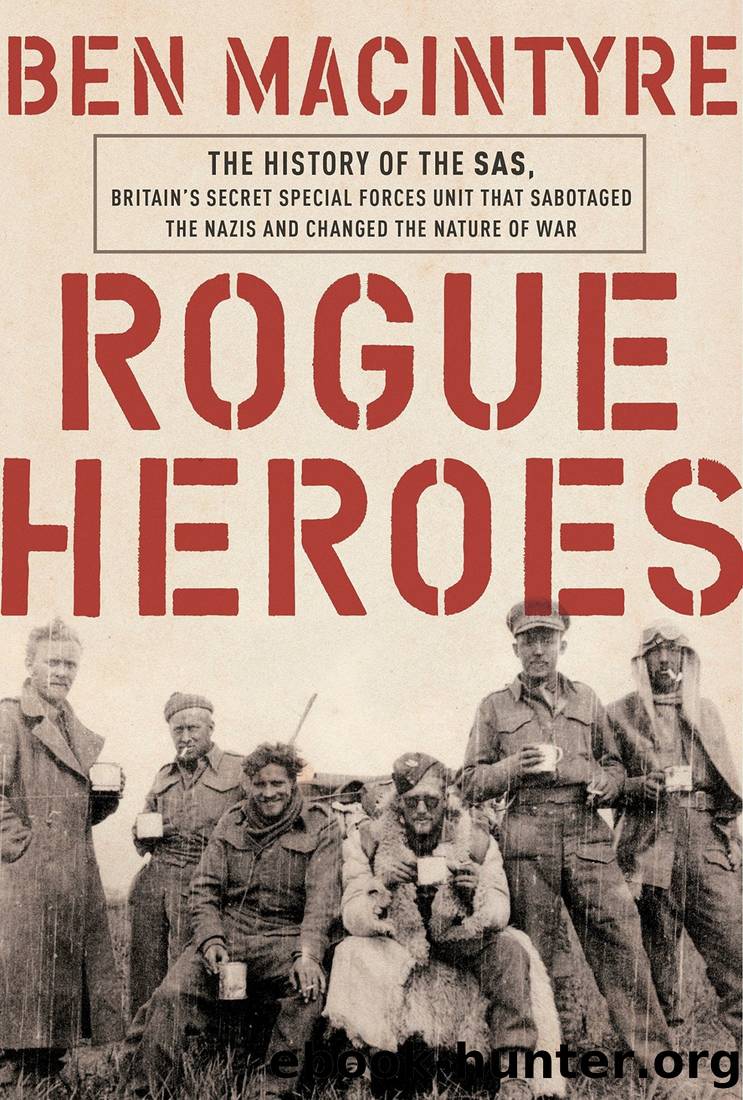Rogue Heroes: The History of the SAS, Britain's Secret Special Forces Unit That Sabotaged the Nazis and Changed the Nature of War by Ben Macintyre

Author:Ben Macintyre
Language: eng
Format: azw3, epub, mobi
ISBN: 9781101904169
Publisher: Crown
Published: 2016-10-04T00:00:00+00:00
14. Alamein
Paddy Mayne lay in the sand, in the cool of the October evening, totting up the booty from his latest raid: two cameras, including a Rolleiflex with viewfinder, some German automatic weapons, a shotgun and a handful of Italian prisoners. ‘The loot has looked up. We were like a lot of pirates,’ he wrote to his brother. ‘We are in the Sand Sea, about 200 miles from the nearest oasis, and just going out and acting the fool from here.’ Mayne’s base camp lay in the dunes on the edge of the Great Sand Sea, some 150 miles south of the coast road and beyond the range of enemy planes. From here, the buccaneers of A Squadron sailed out on nightly raids. ‘Acting the fool’ was a euphemism for piracy of the most ruthless and profitable sort: sabotaging the railway line, ambushing convoys, destroying communication lines, mining the road between Tobruk and Mersa Matruh, and generally causing mayhem in the German rear ahead of Montgomery’s imminent westward surge. In the space of just twenty days, the railway link to Tobruk was severed thirteen times. The threat of night raids forced the German and Italian convoys to travel the road by day, where they were vulnerable to air attack by the RAF.
Mayne’s force of eighty men included most of the L Detachment veterans, including Lilley, Cooper and Fraser. Reg Seekings was not among them; to his chagrin, he was detailed to lick the rookies of B Squadron into shape. Among those under Mayne’s command was a twenty-three-year-old Irishman named Chris O’Dowd, irrepressible and indestructibly cheerful, who had taken part in the failed Benghazi operation. There is a photograph of O’Dowd cleaning his revolver in the desert camp before a raid: his hair is wild and matted, beard untrimmed; he wears shorts, a tattered jersey and a broad grin; he looks filthy, happy and extremely dangerous. At the other end of the social and sartorial scale came Lieutenant Harry Wall Poat, a former tomato farmer from the Channel Islands, who spoke in a refined upper-middle-class accent, sported a neat moustache and was never less than immaculately attired, even after weeks of desert living.
The official reports of this period are rigorously matter-of-fact, a dry litany of violence, deliberately underplayed, austerely factual: ‘Fired on by heavy machine gun, rifle and 20mm fire … unable to get through on radio … had to chase [a] convoy which speeded up when it spotted us … owing to shortage of petrol and water, party split … all jeeps opened up with K guns … hid for three days … ran into minefield … mined road, blew telegraph poles, cratered road …’ And so on. The only allusion to danger is heavily ironic. ‘Much frightened by a cheetah, with whom we shared our lying up wadi.’ There is more detail about the cuisine than the killing: ‘Chased a gazelle for ten minutes, wounded it with K’s and finished it off with a pistol. Made very good eating.’
Traditional
Download
Rogue Heroes: The History of the SAS, Britain's Secret Special Forces Unit That Sabotaged the Nazis and Changed the Nature of War by Ben Macintyre.epub
Rogue Heroes: The History of the SAS, Britain's Secret Special Forces Unit That Sabotaged the Nazis and Changed the Nature of War by Ben Macintyre.mobi
This site does not store any files on its server. We only index and link to content provided by other sites. Please contact the content providers to delete copyright contents if any and email us, we'll remove relevant links or contents immediately.
| Espionage | Hoaxes & Deceptions |
| Murder & Mayhem | Organized Crime |
| Serial Killers | White Collar Crime |
Mindhunter: Inside the FBI's Elite Serial Crime Unit by John E. Douglas & Mark Olshaker(7829)
Wiseguy by Nicholas Pileggi(4582)
Hitman by Howie Carr(4373)
Room 212 by Kate Stewart(4099)
Secrecy World by Jake Bernstein(3773)
Breaking Free by Rachel Jeffs(3618)
Killers of the Flower Moon: The Osage Murders and the Birth of the FBI by David Grann(3605)
Papillon (English) by Henri Charrière(3264)
Killers of the Flower Moon by David Grann(3228)
Say Nothing by Patrick Radden Keefe(3053)
The Secret Barrister by The Secret Barrister(3005)
American Kingpin by Nick Bilton(2966)
Molly's Game: From Hollywood's Elite to Wall Street's Billionaire Boys Club, My High-Stakes Adventure in the World of Underground Poker by Molly Bloom(2962)
Mysteries by Colin Wilson(2883)
In Cold Blood by Truman Capote(2680)
I'll Be Gone in the Dark by Michelle McNamara(2555)
Signature in the Cell: DNA and the Evidence for Intelligent Design by Stephen C. Meyer(2496)
Rogue Trader by Leeson Nick(2469)
Bunk by Kevin Young(2461)
